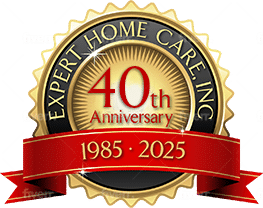One in nine Americans age 65 or older has Alzheimer’s. Symptoms are often mild in the beginning.
Consider this. More than 80 percent of the care older adults receive is from unpaid caregivers. In half of those cases, care is provided to someone with dementia. Plus, 25 percent of family members caring for an adult with Alzheimer’s disease are in the “sandwich generation,” meaning they still have children at home to care for. Maybe it is time to consider companion care at home to give the family caregiver some time for themselves.

If you’re that family caregiver, you’ll have happy moments, shed some tears, and often feel helpless. It’s hard enough having kids at home to help with homework, drive to sports and other after-school activities, and feed. When you add the pressure of caring for a parent, it’s easy to become overwhelmed.
Know the Stages of Alzheimer’s
In the early stages of Alzheimer’s disease, your mom or dad won’t need too much help. After the diagnosis, expect to take over the driving. Most doctors advise against driving once Alzheimer’s is present. You don’t want your parent to get lost because your mom or dad is easily confused.
As the disease worsens, it becomes unsafe for your mom or dad to cook meals. Kitchen fires will happen if your parent forgets something in the oven or on the stove and takes a walk or falls asleep.
In the mid to late stages, symptoms worsen. You may notice your parent’s gait changes and falls happen more frequently. Anger and agitation pick up. Speech declines. Your parent may become easily enraged and lash out physically. Incontinence is also common.
When Should You Arrange Companion Care at Home?
Companion care at home is best if arranged in the early stages of Alzheimer’s. It allows your mom or dad the time that’s needed to form a bond with the caregiver. If you wait until the disease progresses, your parent will have a more difficult time remembering the caregiver.
Make Sure You Have a Strong Support Team
Instead of risking caregiver burnout, sit down and talk to your brothers and sisters about the pressure you feel. Make it clear that you love helping your parent, but you have days where you cannot be in two places at once. If they can’t help you or don’t want to get involved, turn to the professionals in dementia care.
You have to have support. Companion care at home helps you balance the time you spend with your mom or dad with the care your children need. Call our agency and ask about companion care at home and how to get started.
Sources: https://www.alz.org/alzheimers-dementia/facts-figures
If you or an aging loved-one is considering Companion Care at Home in Edison NJ please contact the caring staff at Expert Home Care today at (732) 937-5320.
We have been providing Home Health Care to New Jersey families since 1985, and have grown to become one of the largest licensed providers of Live-In Home Care in the upper New Jersey area. Our many years of New Jersey home care experience has produced a company that over 8,000 clients have come to rely on confidently, for help.
- Risk Factors for Loneliness - April 22, 2025
- Common Challenges Seniors Face in Cars - April 7, 2025
- How Volunteering Can Help Your Senior Parent Find Purpose - March 24, 2025

